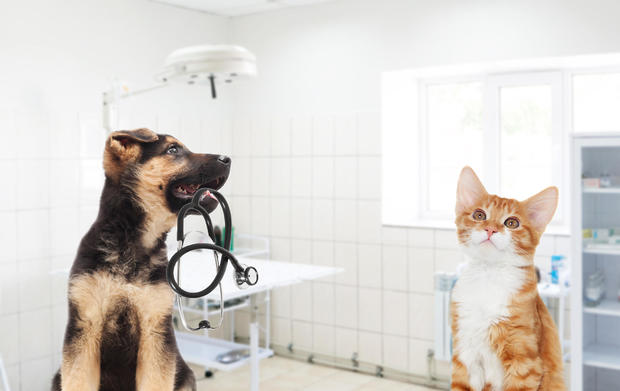How to save money on vet bills
Your pet is a part of the family. You love them, care for them and try your best to keep them healthy and happy. However, vet bills can get costly fast, especially for unexpected illnesses and emergencies. So, as a pet owner, it's essential to find ways to save on vet bills without compromising your pet's health and well-being.
Thankfully, there are numerous ways to do this while still ensuring your pet receives high-quality care.
Save money on vet bills with pet insurance — get a free quote here!
How to save money on vet bills
By utilizing as many of these strategies as possible, you can keep your pet — and your bank account — healthy for years to come.
Get pet insurance
While pet insurance may initially seem like an additional expense, it can make a significant dent in your overall vet costs. Most pet insurance plans cover illnesses and accidents, while others cover additional expenses such as routine care and dental cleanings. By investing in a health insurance policy, you can be reimbursed for up to 90% of your pet's medical costs.
To find the best pet insurance for your needs at the best price, ask yourself these questions and get quotes from multiple providers.
Keep up to date with routine and preventative care
Preventing health issues before they arise is an easy way to save on veterinary bills. Schedule regular checkups with your veterinarian and keep up to date with all recommended vaccinations, flea and tick medication and other preventative care measures.
By detecting health issues early, you can save money on expensive treatments and surgeries you could have avoided. Preventive care can help you catch minor health concerns before they escalate into bigger ones.
Start exploring your pet insurance options by getting a free quote today.
Comparison shop
You can save money on pet prescriptions by purchasing generic medicines, comparing prices at local stores or ordering medications online. Generic drugs are less expensive than their brand-name counterparts but can be just as effective. In addition, many online pharmacies offer discounts on prescription medications.
To find a reputable and safe place to purchase pet medicine, ask your vet for recommendations and check out customer reviews online.
Get a written estimate for treatment
Before you agree to a treatment plan for your pet, ask your vet to give you a written cost estimate. This can help you better budget for the expense and make the best decision for your pet given your financial situation.
If you don't think you'll be able to afford treatment, have a candid discussion with your vet and ask if there are any less-expensive options that can address your pet's health issue. While you both want to give your pet the highest level of care, vets understand that pet owners have financial restrictions, and yours might be able to suggest alternative treatments that can help alleviate the issue.
Ready to save on your pet's vet bills? Check out price insurance prices online now.
Give your pet plenty of playtime
Sedentary pets are more likely to develop health problems like weight gain. In addition, a bored pet may get into things they shouldn't or engage in anxious behavior like chewing on themselves.
By keeping your pet active and engaged, you can save on the medical bills that could come from having too much time and energy on their hands (or, rather, paws). So, be sure to give your pet plenty of physical exercise, as well as mental stimulation through things like puzzle toys.
The bottom line
As a pet owner, keeping your pet healthy is a top priority, but it doesn't have to break the bank. By following the tips outlined above, you can save money on vet bills while still providing the best care for your furry friend.




